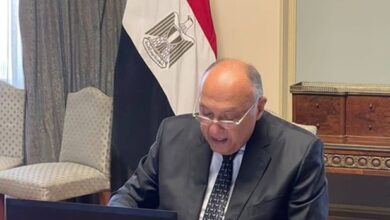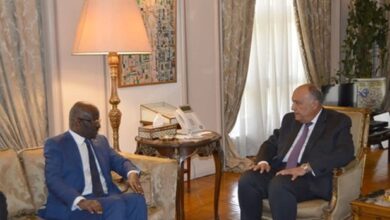The appointment of Mohamed El-Orabi as Egypt’s new foreign minister represents the continuation of the former regime’s policies in both the domestic political landscape and the international one, experts say.
Furthermore, diplomats at the Ministry of Foreign Affairs say that Orabi was one of the closest ambassadors to the family of ousted President Hosni Mubarak.
“The choice of El-Orabi shows that the country’s military rulers and the cabinet are adopting the wrong strategies in shaping the foreign policy of Egypt. El-Orabi is not a figure who represents Egypt’s interests after the revolution,” said Abdullah al-Ashaal, an ex-diplomat and a presidential hopeful.
Orabi has been a career diplomat for almost 35 years. He served as the deputy ambassador to Israel from 1994 to 1998, and has worked in the United States and Britain. He was Egypt’s ambassador to Germany for eight years, from 2001 to 2008.
His father, Ibrahim El-Orabi, was chief of staff of the Egyptian Armed Forces in the 1980s.
Orabi is now the chargé d'affaires of the Ministry of Foreign Affairs, and if he takes the oath, he will be the second foreign minister since the revolution, following on from veteran diplomat Nabil al-Araby.
Egypt’s Ministry of Foreign Affairs is one of the top ministries in Egypt, with only 1000 diplomats, who are usually chosen from among the nation's upper middle class.
Critics say that Mubarak, at least over the past decade, took certain strategic files (such as relations with Israel and Palestinian factions, relations with Iran, and the Nile and Sudan) away from the ministry, handing them instead to the intelligence apparatus.
According to a source at the ministry, who spoke under condition of anonymity, during his three months as foreign minister (March to June), Nabil al-Araby managed to reclaim all these files.
Araby, who was elected last month as the secretary general of the Arab League, focused – according to experts – on three major issues as the priorities for Egypt foreign policy: opening the Rafah border crossing between Gaza and Egypt, improving ties with Iran, and achieving reconciliation between the rival Palestinian factions.
“Recently, the developments in all these files have been very slow. By appointing El-Orabi, the Supreme Council of the Armed Forces is telling us that there will be no progress whatsoever on those files,” said Ashaal.
But lacking the necessary qualifications is not the only concern.
Orabi is believed to be one of those ambassadors who were active in supporting the political inheritance project, by which public funds were used to promote Gamal Mubarak to Western political circles as a strategic ally, like his father.
“[El-Orabi] wasn’t known, except for those who dealt with the Heliopolis Association, presided over by Suzanne Mubarak, wife of the ousted president,” wrote columnist Wael Qandil in Tuesday’s issue of the daily Al-Shorouk newspaper.
Sources at the Ministry of Foreign Affairs confirmed Orabi's close ties with the Mubarak family, and some observers say that his profile rose significantly because he accompanied Mubarak and his family on trips to Germany when the former president visited for medical treatment.
“That’s why he served eight years as an ambassador in an important country like Berlin. Let me tell you the policy. All the ambassadors who are working in major capitals such as Washington, London, Paris and Geneva have to be close to the former president,” said a diplomat at the Ministry of Foreign Affairs who asked to remain anonymous.
The revolution that rocked the national political scene seems to have left the influential ministry untouched.
“The problem that young diplomats have with El-Orabi is not only that he was one of the figures close to the regime but also that he belongs to the very system in which some diplomats are competing,” added the source.
“He is one of the people who benefited from using their ties with the regime to get promoted. As he is getting the post of minster, he will perpetuate the same system. I mean that he will simply adopt the norms of nepotism in dealing with diplomats,” said the source.
According to official figures, Egypt has around 145 diplomatic missions throughout the world, and some observers have raised concerns about the appointment of diplomats serving in important capitals.




